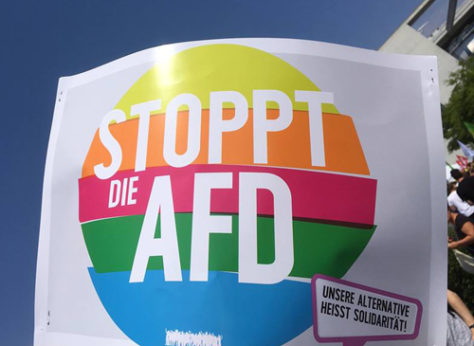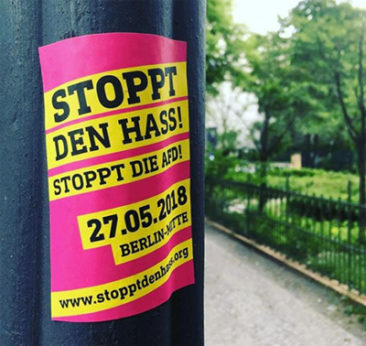
BERLIN – Hopes and fears compete amidst the turmoil of today’s world. Fears for the worst in Korea have lessened with hopes, after a series of typical Trumpian somersaults, that the thrust of the Bolton-Haley-Pompeo line may yet give way to negotiations and diplomacy.
But looming ever closer is the question of Iran, with the same cabal pushing demands, treaty-busting, which recall Serbia, Afghanistan, Iraq and Libya. The world knows all too well the tragic results in all four, also far beyond their borders, while their direct comparisons with Libya make their goals all too clear – and fearsome. A single click tells us that Iran, far stronger, has a larger population than the latter three combined.
Can and will the other Iran treaty partners bow to the potent pressures from Washington – or will they uphold an agreement which has provided such welcome relief? Europe must decide. With Germany the strongest power in Europe, the outcome will largely depend on its decision.
At the moment it seems to be following the advice of my second favorite wit (after Mark Twain), the late, great baseball player and joker Yogi Berra who, along with many other wise words, counseled: “When you come to a fork in the road, take it.”
Trade interests in Germany, the U.S., and China
In the current fork situation, one main road, paved from the start by mighty interests in both Germany and the USA, is cemented by the huge trade between them, often bound up with making and selling cars (even cleverly–manipulated poisonous ones). But it’s hard to obey Trump’s brazen demands for internationally illegal sanctions without seeming wimpy and subservient. And that is odious, with Germany facing challenges enough these days in Europe, with London still teetering with its Brexit, Macron vying for European leadership, Eastern Europe rebelling on accepting refugees, Spain torn by the Catalan issue and corruption scandals and Italy now in a total mess.
The other road, defying Donald, has gained some ground with Angela Merkel’s recent visit to China, Germany’s other main trade partner. Will she and her government have the strength and will to join France, Britain – and Russia and China as well – and show the Bolton gang that middle finger? Who knows? Thus far they are still stuck in Yogi Berra’s divided position.
But there is another earnest road fork in Germany, with equal dangers in the long run. It is the increasing threat of a fascist track! The five-year-old Alternative for Germany (AfD) won seats in 14 German states (with the last two soon to come) and has 92 representatives in the national Bundestag. This enables its often clever and highly educated spokespersons to spout their poison in every debate and, thanks to their rank in seats, as the first speakers after those of the government.
Much of the media, even government-run TV channels, has been overfriendly in giving them air-time. Their positions fluctuate; they may oppose sanctions on Russia but then demand a bigger, aggressive army, once again with a draft. They express deep sympathy for the millions hit by rising rent costs, but are against all cuts in the take-home millions of the super-wealthy. Some leaders praise the brave soldiers in Hitler’s Wehrmacht and denounce the Holocaust Memorial as a shameful blot on Germany’s fine reputation, but then loudly oppose anti-Semitism while praising Netanyahu’s leadership for making Israel “a model in dealing with illegal Muslim migration.” Aside from anti-feminism their one consistent appeal, aimed at worried and disturbed German voters, is pure, unadulterated hatred of “non-Germans”, especially refugees from war-torn regions in the Near East. “We are the many who love Germany. The rule of Islam in Germany is nothing but the rule of evil!”
Berliners against the Afd
The polls give them 13-14 percent nationally, even 22-23 percent in some East German states. In Berlin their stand is now 11 percent; they were able to win seats – and a nasty voice – in all 12 borough councils. Maybe this is why they chose Berlin for a big all-German demonstration, to march from Washington Platz at the main railway station through a downtown area to a big final meeting on the west side of the Brandenburg Gate.

But they had no sooner announced this plan when, Berliners, or a large number of them, said loudly NO! And this is what made last Sunday the biggest heart-warming event in years! The slogan was: “Stop Hatred! Stop the AfD!”.
The far-right plans, with the slogan “Germany’s Future”, were first set at 10,000 adherents; allegedly they hoped for many more from all over Germany. But on Sunday all such plans and hopes had to be abandoned; their ranks were far thinner, even with buddies from openly pro-fascist gangs. All the same, after bold start-off rhetoric and distributing a thousand or more big German flags, they joined ranks and set off on their anti-foreigner, anti-Islam, anti-leftist Berlin crusade.
But they were faced from the start, across the narrow Spree River, by a crowd of over a thousand calling out its opposition, and soon joined by a small flotilla of boats and rafts, with equally loud anti-fascists shouting “No to Nationalism” and big banners saying “Für Menschenrechte – gegen rechte Menschen!” (approx. transl. -“For Human Rights – Against Rightists!”) and “Refugees Are Welcome Here”.
The AfD route of march was carefully protected by two thousand policemen, who blocked off every non-rightist attempt to cross near the meeting place at Brandenburg Gate. But a long detour led to the back of it, in Berlin’s big central park, the Tiergarten, where more and more thousands listened, loudly applauding but relaxed, to hours of short speeches and musical offerings on the huge lawn in front of the Reichstag building where the Bundestag holds sessions (but was hermetically kept off bounds on this Sunday).

Then, down the long thoroughfare which cuts through the park, came the about thirty sound trucks, decorated as floats by Berlin’s many popular dance and entertainment clubs, each one with different clothing, (including one “queer” float, of course) and with different but always very loud music, under the slogan “Bass away the AfD”! It was a hot day, clothes of the mostly young crowds on and around each truck were colorful if often very skimpy, while everyone, it seemed obvious, was both very determined but also having a good time.
One club leader explained their participation: “Berlin‘s club culture is everything which the Nazis aren’t and which they hate: We are progressive, queer, feminist, antiracist, inclusive, colorful and we even keep unicorns”.
Crowds and crowds, with young and some elderly LINKE, Social Democrats and Greens, but mostly from no party or organization, many with young children, moved as close to the AfD meet as the police permitted. The closest ones climbed every flagpole, mast or tree and made as much noise as possible, not quite able to outdo the AfD amps, but loud enough to make their point. A great number carried signs or big stickers or wore sloganed tee-shirts saying “Welcome to Refugees,” “No to Racism,” “No Fascists in Berlin” plus a wide assortment of responses to AfD anti-abortion and homophobic “family” policies. (Personal note: My sign, “New Yorker against AfD and Racism,” got at least a thousand smiles or thumbs up greetings plus maybe a hundred photo requests.)
But the opposition was not just in the Tierpark. A large number of theater people, free-lance artists and musicians joined in a “Glorious Demonstration” that moved from a northern city park through town until it reached and filled the eastern side of Brandenburg Gate (near the U.S. Embassy), usually filled only with tourists.
A gay organization met, separately to start with, then hastened through the Tiergarten to join the main crowd. Another contingent was “Grannies against the Rightists.” There was one group of refugees and immigrants, defying the fascists and thanking for solidarity in a “cosmopolitan Berlin.” Bertolt Brecht Platz became a second, symbolic gathering place for many anti-fascists. In all, thirteen different organizations joined in to say no to the AfD.
How many were there on one side or the other? For the AfD crowd, estimates varied from 2,000 to 5,000 but circled in at about 2,500.
And on our side? Who could count them? Aside from those in organized groups and at the main meeting sites there were so very many who just joined in on their own to add their voices or their presence. The police counted 25,000; other estimates topped 70,000 – even on a hot, sunny Sunday when large numbers of Berliners usually flee to the lakeshores or their summer bungalows.
There were a few minor clashes when masked, black-clad “autonomists,” as they call themselves, tried to break through police cordons to attack the AfD crowd physically. Tear gas was used once; a few were arrested. And when crowds from both sides collided at the big Friedrichstrasse subway-elevated station on their way home there were a few fights, naturally exaggerated by the right-wing media. But this was peripheral. The event was largely not just violence-free but cheerful, permeated with a feeling; “This time we showed them! They won’t be coming back soon to Berlin!”
The threat from the far right is still there
But while fully enjoying this successful Sunday, most remained well aware: That other road fork has not disappeared, and has moved the general political scene rightward. A few recalled that in 1928 Hitler’s Nazi Party got just over 800,000 votes. Two years later, after the Depression hit, the sum jumped to 6.3 million, making it the second strongest party. Three years later it seized power and destroyed opposition, brutally and bloodily, and then most of Europe. In a poll yesterday the Social Democrats, though still in second place after Merkel’s CDU, were down to 17-18 percent, while the AfD was up to 13-14 percent. Will there be another crisis – or depression?
In his speech at Brandenburg Gate, AfD-boss Alexander Gauland spelled out future plans:
“We stand here because we love our country and will not give it up… Germany is the country of our fathers and mothers and we want to keep it the way it was… Nobody should think that the AfD will go away. We are staying and defending ourselves against the multi-kulti insanity. Our protest will continue and gain strength until the AfD takes over responsibility. And that will mark the end of open borders.”
I am reminded of two quotations. One famous one about fascism is by Bertolt Brecht: “The womb is fertile still from which that crept.” Another, also famous, is again by Yogi Berra, but this time without a smile: “It ain’t over till it’s over!”










